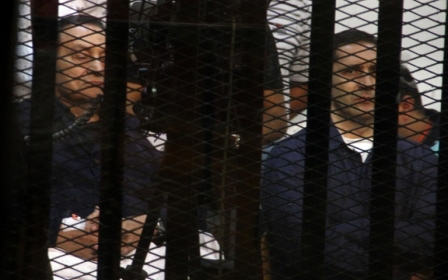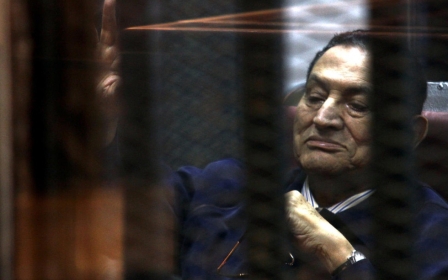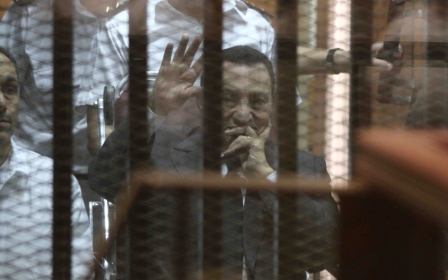Mubarak trial postponed until 29 November following court appearance

Deposed Egyptian president Hosni Mubarak appeared in court on Saturday for the verdict in his murder retrial over the deaths of hundreds of protesters during the 2011 revolt that ended his 30-year rule.
Not long after entering court, however, a judge announced his trial would be postponed until 29 November.
The move provoked incredulity on social media:
Before announcing the postponement, the court showed a video highlighting the enormous quantities of information used in deliberating over the case – allegedly 160,000 pages.
The video was produced and narrated by private satellite channel Sada el-Balad, which has exclusive broadcasting rights over the trial.
There were reportedly clashes with police following the announcement.
Mubarak is accused, alongside seven of his former police commanders, of involvement in the killing of demonstrators during the 18-day uprising. An appeals court overturned his initial life sentence on a technicality.
The 86-year-old was wheeled in on an upright stretcher into the caged dock, dressed in the blue garb of a convicted felon and wearing his trademark shades.
Earlier he was transported by helicopter from a military hospital to the sprawling police academy where the court sits.
Police set up roadblocks around the complex and about a dozen protesters gathered in support of the ousted autocrat.
"I am here for Mubarak," said Ahmed Said. "Enough injustice. He must be freed and receive honours."
Chief judge Mahmud Kamel al-Rashid will pronounce Mubarak's fate in a different climate from the heady days that followed his overthrow, which at the time seemed like a swingeing defeat of autocracy.
Mubarak's successor, the Islamist Mohamed Morsi, was himself overthrown by the military and imprisoned along with thousands of Muslim Brotherhood supporters amid a widespread campaign tarring the 2011 uprising as a sinister plot to weaken Egypt, a faded regional power.
Morsi, imprisoned under his predecessor, is now also on trial with other Islamists and stands charged with committing acts of violence during the anti-Mubarak uprising.
Youth leaders who spearheaded the anti-Mubarak revolt have similarly been jailed for staging unauthorised protests after the June 2013 ouster of the divisive Morsi by army chief Abdel Fattah al-Sisi.
Sisi, who won a presidential election in May, has emphasised law and order at the expense of freedom to protest, a popular stance among many Egyptians fed up with the chaos and economic ruin of their experiment with democracy.
The police force, which Mubarak is accused of ordering to quell the 2011 uprising, is now feted in the largely pro-government media as it wages a deadly crackdown on pro-Morsi Islamist protesters and militants.
'Justice in my life'
One newspaper editor, Ibrahim Eissa, a major dissident under Mubarak, testified at the retrial that it was perhaps foreign saboteurs and not police who were responsible for deadly violence during the uprising.
Mubarak's former interior minister and co-defendant Habib al-Adli, who had also been sentenced to life, accused Morsi's Muslim Brotherhood and Palestinian forces of attacking protesters during the uprising to besmirch the police.
Mubarak - separately sentenced to three years in prison for corruption - told the court that at the age of 86 he was approaching the end of his life "with a good conscience".
"The Hosni Mubarak before you would never have ordered the killings of protesters," he said in August, vaunting economic achievements many Egyptians now remember with nostalgia.
Most witnesses - senior military and police officials who served under Mubarak - testified on camera in the retrial that began in May 2013.
Their accounts were reportedly favourable to Mubarak.
The same court will also deliver its verdict on corruption charges levelled against Mubarak and his sons Alaa and Gamal.
Victims of the anti-Mubarak uprising fear the changing political tide might rob them of justice and that Saturday's delay will work in Mubarak's favour.
"Now there is a wave of defamation against the revolution and the youths who led it," said Osama al-Meghazi who was badly injured by police during the 2011 uprising.
On 28 January, 2011, after protesters in the Mediterranean city of Alexandria left a mosque, police opened fire with tear gas and shotguns, blowing off Meghazi's hand.
"It is important that I see justice in my life," he told AFP.
Gamal Eid, a rights lawyer who represented Mubarak's alleged victims in court, said he was not hopeful of a tough sentence against him or the police chiefs - six of whom were acquitted in the first trial in June 2012.
"I have no confidence, given the past rulings, either against the criminals of the Mubarak regime or the revolutionaries," said Eid.
"The trials follow the political climate."
Stay informed with MEE's newsletters
Sign up to get the latest alerts, insights and analysis, starting with Turkey Unpacked
Middle East Eye delivers independent and unrivalled coverage and analysis of the Middle East, North Africa and beyond. To learn more about republishing this content and the associated fees, please fill out this form. More about MEE can be found here.




